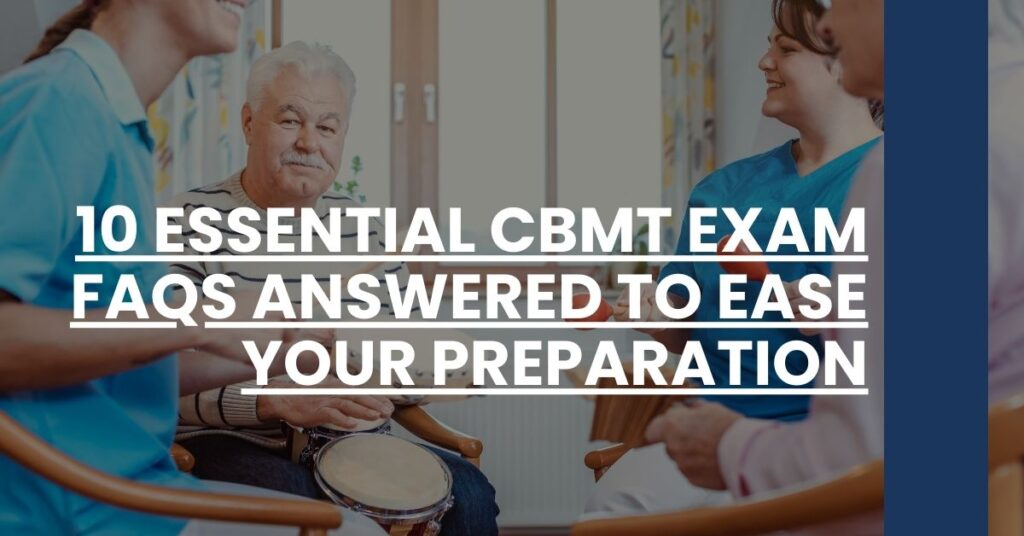Struggling to demystify the CBMT exam landscape? Effective preparation hinges on accurate information.
Grasp the essentials with these crucial CBMT exam FAQs, uniquely curated to resolve your queries.
Expect clear, direct insight – minus the fluff.
- 1. What Is the CBMT Certification?
- 2. Who Is Eligible for the CBMT Exam?
- 3. How Do I Apply for the CBMT Exam?
- 4. What Does the CBMT Exam Cover?
- 5. What Are the Best Study Resources for the CBMT Exam?
- 6. How Is the CBMT Exam Scored?
- 7. When and Where Can I Take the Exam?
- 8. Are There Any Accommodations for Test-Takers with Disabilities?
- 9. What Is the Policy on Retaking the CBMT Exam?
- Certification Renewal Process
- Conclusion: Moving Forward with Confidence
1. What Is the CBMT Certification?
If you’re venturing into the world of music therapy, obtaining your Certification Board for Music Therapists (CBMT) credential is a pivotal step. This isn’t just another piece of paper to frame; it’s a symbol of your dedication to upholding high standards within the therapy community. It signifies that you’ve acquired a robust set of clinical competencies and are committed to maintaining ethical practices.
The CBMT certification showcases your expertise to employers, clients, and peers, ensuring that recognized international standards have been met. After all, passing the CBMT exam isn’t only about being recognized—it’s about validating your qualifications to provide exceptional therapeutic care.
2. Who Is Eligible for the CBMT Exam?
Ready to take a leap towards your music therapy certification? First, check if you’re eligible. To sit for the CBMT exam, there are specific prerequisites you must meet:
- Academic background: Completion of a degree in music therapy from a program approved by the American Music Therapy Association (AMTA).
- Clinical training: A minimum number of hours in a supervised clinical internship, ensuring you have practical experience in the field.
This rigorous process ensures that all potential certificants are thoroughly prepared to provide quality music therapy services. Regularly maintain your certification with recertification every five years, showing continuous professional development—essential in a field that constantly evolves.
3. How Do I Apply for the CBMT Exam?
Don’t let the application process intimidate you. It’s fairly straightforward, involving four main steps:
- Complete your academic and clinical training.
- Submit the application form, available on the CBMT website, with all required documentation.
- Pay the application fee. Ensure you understand all applicable costs, as this is an investment in your career.
- Once approved, schedule your exam within the 90-day testing period.
An effective strategy for your CBMT exam preparation includes understanding these steps and making sure everything is in order before your application.
4. What Does the CBMT Exam Cover?
Upon diving into your studies, you’ll find the CBMT exam is comprehensive, designed to assess your knowledge in key areas. The exam covers several domains reflecting the scope of music therapy practice:
- Assessment: Understanding client needs and developing treatment plans.
- Treatment Implementation: Applying music therapy techniques effectively.
- Evaluation and Termination of Treatment: Analyzing client responses and documenting outcomes.
Tailoring your study plan to these domains increases your potential for exam success.
5. What Are the Best Study Resources for the CBMT Exam?
When it comes to acing the CBMT exam, it’s all about having the right tools in your study arsenal. By collating a mixture of authoritative resources—like comprehensive textbooks, professional journals, and expert-compiled guides—you lay the groundwork for a successful study journey. Consider pooling resources like:
- Practice tests: Simulate real exam conditions to enhance recall and reduce anxiety.
- Study guides: Utilize notes and compilations, such as these suggested by Wendy Ishii Music.
- Peer groups: Engage with peers to discuss concepts and challenge each other’s understanding.
Incorporating a variety of resources can enrich your knowledge and boost your confidence.
6. How Is the CBMT Exam Scored?
Understanding the CBMT exam’s scoring system can help demystify the process and clarify what’s expected. Here’s what you need to know:
- Raw score: This is based on the number of correct answers—it’s straightforward; there are no penalties for guessing.
- Passing score: The benchmark varies slightly with each exam but is set in accordance with professional standards.
Failing to meet the passing score need not spell the end of your certification pursuit—you’ll have opportunities to retake the exam, a process that’s both supportive and fair.
7. When and Where Can I Take the Exam?
The CBMT exam is not limited to just any single date or location—it offers you the flexibility to choose a time and place that suits your schedule. Partnered with PSI testing centers, the CBMT offers exam sites both domestically and internationally, ensuring that you can find a convenient location to showcase your capabilities.
When selecting your exam date, remember these key steps:
- Review the available dates: As part of the application process, you’ll receive information on testing dates.
- Choose your location: Use the PSI website to locate your nearest testing center.
- Schedule your exam: Once your application is approved, promptly schedule your exam within your given 90-day window.
By planning ahead and selecting a date and location that align with your preparation schedule, you can approach the exam with confidence and calm.
8. Are There Any Accommodations for Test-Takers with Disabilities?
Your success on the CBMT exam shouldn’t be hindered by any disability you may have. Recognizing this, the CBMT adheres to the Americans with Disabilities Act (ADA) and provides accommodations to ensure a fair testing experience for all candidates.
Requesting accommodations involves a clear process:
- Advance planning: Make your requests well before your exam date.
- Documentation: Provide professional documentation detailing the nature of your disability and the accommodations required.
- Approval: Wait for confirmation from CBMT and PSI—keep in mind, this may affect your scheduling process.
It’s paramount that you have access to a testing environment that meets your needs, so don’t hesitate to communicate your requirements as clearly and early as possible.
9. What Is the Policy on Retaking the CBMT Exam?
Experiencing setbacks is a part of life, and sometimes these come in the form of not passing the CBMT exam on your first try. But don’t be disheartened—there is a retake policy in place to help you get back on track.
Consider the following when planning a retake:
- Waiting period: You must wait 90 days before you can reapply to take the exam.
- Additional attempts: There is a limit to the number of times you can retake the exam within a certain timeframe—you’ll want to prepare to make each attempt count.
- Fee: Keep in mind that each attempt requires a new fee, so it’s in your best interest to reevaluate your study methods before rescheduling.
Put simply, you have more than one shot at success. Utilize the interim wisely to hone your understanding and exam strategy.
Certification Renewal Process
Entering the music therapy field as a certified professional is an ongoing commitment, not a one-time achievement. The certification renewal process is an important aspect of your professional journey, ensuring your skills and knowledge stay sharp and relevant.
To maintain your certification, you should:
- Track your recertification credits: 100 credits within a five-year period are necessary to renew.
- Stay informed about policy updates: This could include changes in credit requirements or the certification process.
- Submit your Application for Recertification: Do this before your certification expires to avoid any lapse in your MT-BC credential.
By staying diligent with these steps, you’re not only adhering to the standards set by the CBMT, but you’re also demonstrating your commitment to high-quality care in music therapy.
Conclusion: Moving Forward with Confidence
Preparing for the CBMT exam can be daunting, but with the right tools and information, derived from these CBMT exam FAQs, you can navigate the path with less stress and more strategy. Your certification journey is one of continuous learning and growth, and by approaching each step with determination and preparedness, you’re setting yourself up for a fulfilling career in music therapy. Embrace this challenge with enthusiasm, knowing that every study session, every practice test, and every hour of clinical experience is sculpting you into the competent and confident music therapist you’re destined to become.
CBMT exam FAQs answered: Discover eligibility, preparation resources, scoring details, and maintenance strategies for music therapy certification.

